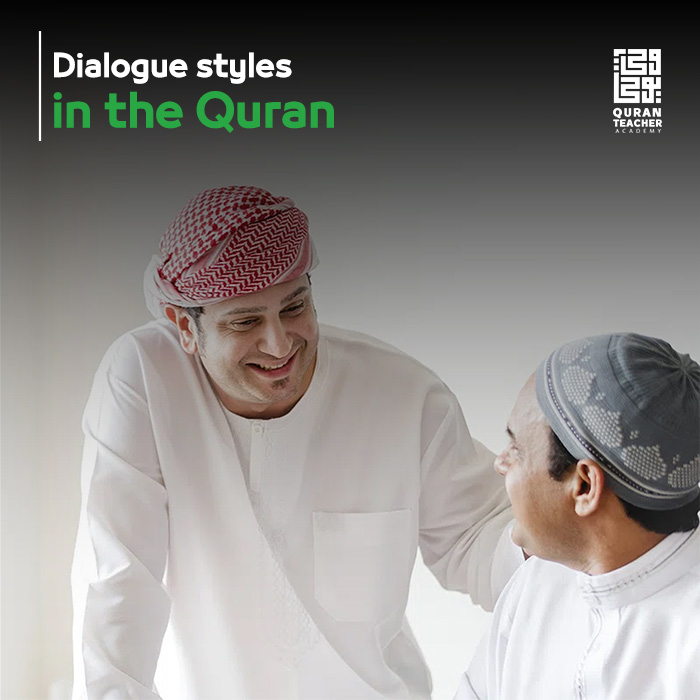The Holy Quran is an important source of ethics and high directives, and contains the methods and principles of constructive dialogue, in light of human diversity and the disparity in opinions and beliefs, the importance of dialogue comes to promote understanding and effective communication between people,
and in this article, we will explore the methods of Dialogue styles in the Quran, and Quranic verses that highlight the importance of dialogue and its constructive methods.
Dialogue styles in the Quran
The Holy Quran and the Sunnah of the Prophet provide us with several methods and principles of dialogue that we can be inspired by, and work according to them, and these are some of the important methods of Dialogue styles in the Quran, discussion, communication, understanding and dealing with good manners and morals in accordance with Islamic teachings:
1- Wisdom and reflection
The Holy Qur’an calls for reflection and reflection on its verses, in order to understand the deep meanings, wisdom and guidance contained in it, so when dialogue, we must have wisdom and exhortation, and consider the appropriate conditions and attitudes to express our opinions and guidance.
2- Respect and friendliness
Respect and friendliness are the basis for dealing with others, whether they support us in opinion or disagree, so we must be kind and flexible and respect the opinions of others even if they do not agree with us in some matters.
3. Understanding and cooperation
We must seek to understand and listen to the views and ideas of others openly, where through effective cooperation and communication, we can provide a safe and comfortable environment for everyone to express their opinions and share their views without obsession or suspicion.
4- Constructive and logical dialogue
It is also necessary to engage constructively and logically in dialogue, reinforcing arguments and evidence, avoiding sterile debates and personal attacks that do not work and do not help, and we must strive to provide strong and convincing arguments to support the point of view we wish to discuss.
5- Patience and calculation
There may be differences and differences in the dialogue, so we must be patient and calculate this, it may take a lot of time to achieve consensus and understanding, however, we must remain tolerant and respect others even if their opinions are different.
It is worth mentioning that Islam encourages peaceful coexistence and constructive cooperation with others, and to develop our skills in effective communication and fruitful discussion, and therefore the Holy Quran and the Sunnah of the Prophet contain values and behaviors that serve as ethics for dialogue and discussion, including:
- Good listening
- Softness and kindness
- Wisdom and Dream
- Inference by evidence
- Respect and flexibility
- Humility and apology

Read also about: Islamic personality
Characteristics of the style of dialogue in the Quran
There are several characteristics of the style of Dialogue styles in the Quran, and these characteristics serve as the pillar on which good and constructive dialogue is built, and these are some of them:
1- Wisdom and sophistication: Words and words should be carefully chosen to convey the message in an effective and effective way, with the use of proverbs, similes and stories to illustrate ideas and concepts.
2- Respect and softness: Even when criticizing or giving advice, this is done gently and friendly, avoiding hostile or provocative language, and individuals are treated with sophistication and humility.
3- Inference and logic: Logical evidence and arguments are used to convince humans of the truth and call them to good, in addition to asking thinking questions to stimulate reflection and reflection.
4- Honesty and clarity: that methods of misinformation or deception are not used in communication, and instead, the facts are presented clearly, indicating the consequences of good or bad behavior.
5- Emotional impact: Compassion and kindness contribute to attracting people’s hearts and motivating them to follow the truth and good values, by focusing on hope, hope and justice to create a positive impact.
Quranic verses urging the importance of dialogue
The Holy Qur’an mentions many verses that urge the importance of dialogue, including:
1- The Almighty says: {Call to the way of your Lord with wisdom and good exhortation and argue with them in the way that is better, for your Lord is the most knowledgeable of those who have strayed from His path, and He is the most knowledgeable of the converts} [Al-Nahl: 125]. This verse emphasizes the importance of using dialogue in calling to God, using wisdom and good advice, and arguing with them in the best way, that is, in an acceptable manner that respects the mind and feelings of the opponent.
2- The Almighty says: {And we did not send a messenger except through the tongue of his people to show them that God will guide whoever he wants and guide whoever he wants, which is the dear and wise} [Ibrahim: 4]. This verse emphasizes the importance of language in communicating with others, and that God Almighty sent His messengers through the tongue of their people so that they could deliver His message to them.
3- The Almighty says: {And I or you are guided or in a clear delusion} [Sheba: 24]. This verse tells us that dialogue between people must be characterized by mutual respect, that each of the parties to the dialogue believes that it is right, and therefore dialogue must be based on detachment from personal whims.
4- The Almighty says: {And tell my servants, they say, which is better, that the devil is bleeding among them, that the devil was a clear enemy for man} [Al-Isra’a: 53]. This verse urges the use of good words in dialogue, in order to avoid conflict and strife between people, and because Satan seeks to spoil relations between people.
Read also about: Stories of the Quran
What is the ethics of dialogue in the Sunnah?
The Sunnah of the Prophet is considered an important source of guidance and teachings of the Prophet Muhammad, may God bless h
im and grant him peace, as it contains the principles and ethics of dialogue in an unparalleled way, and these ethics in the Sunnah include:
1- Honesty and honesty: Interlocutors should be honest in expressing their opinions and orientations, and not manipulate facts or mislead others.
2- Respect and friendliness: You should be treated with kindness and gentleness, not resorting to derogation or insult, and opinions should be expressed in polite and respectful ways.
3- Active listening: It is important that the other party is given the opportunity to express their point of view and finish their speech before responding.
4- Justice and fairness: by treating others fairly and impartially in favor of anyone, while considering facts and evidence objectively and fairly before making decisions or conclusions.
5- Compassion and compassion: Interlocutors should be sensitive to the feelings of others and empathize with them.
6- Constructive goal: Dialogue should be oriented towards a constructive goal and common benefit, and the discussion should be oriented towards the search for truth, mutual benefit, and consensus as much as possible.
Read also about: Islamic Creed
The importance of using the dialogue method
It can be said that the use of the method of Dialogue styles in the Quran contributes to building healthy and fruitful relationships between individuals and communities, as dialogue enhances our understanding and cooperation, helps in resolving conflicts and building bridges of communication and trust,
and also contributes to the development of knowledge and expertise, and the achievement of justice and equality. Therefore, the use of dialogue is a powerful tool for improving human relations and developing societies.
1. Promote understanding and cooperation
Through open and honest dialogue, individuals can exchange their views and understand each other better, leading to more effective cooperation in different fields.
2- Resolving disputes and disagreements
Dialogue in the Quran is an effective tool for resolving disputes and differences, when opinions and positions are presented in an open and impartial manner, the conflicting parties can work together to find common and consensual solutions, and dialogue contributes to calming tensions and building an atmosphere of trust and mutual respect.
3- Exchange of knowledge and experiences
Dialogue can contribute to the exchange of knowledge and experiences between individuals and communities, and when discussion and exchange of views are opened, individuals can benefit from the understanding and perspectives of others and gain new knowledge and learning opportunities.
4- Promoting development and change
Dialogue styles in the Quran can also contribute to promoting development and positive change, opening the door to dialogue and listening to different points of view, individuals can adopt new ideas and develop in their thinking and behavior, while stimulating innovation and progress in various fields.
5. Achieving justice and equality
Dialogue can contribute to justice and equality in societies, because giving all voices the opportunity to express their views and participate in decision-making promotes equality and justice in the distribution of power and opportunities.
Read also about: Islamic Dawah
The Holy Quran carries with it great messages about the importance of dialogue and constructive communication, as good and fruitful dialogue can be a reason for achieving understanding and harmony between different individuals and communities.
The application of the Qur’anic principles of dialogue can contribute to building bridges of understanding and spreading the spirit of tolerance and mutual respect. In this context, Wahion Youha Academy for Islamic Studies promotes the spirit of dialogue among others, by providing a range of courses and programs that qualify new young people to accept and welcome a plurality of views.


